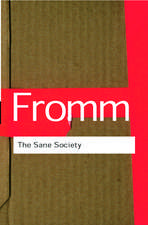Hierarchy and Organisation: Toward a General Theory of Hierarchical Social Systems: Routledge Studies in Management, Organizations and Society
Autor Thomas Diefenbachen Limba Engleză Hardback – 21 iun 2013
This is the first time such a theory is attempted. With the help of the theory developed in this book, it is possible to interrogate systematically, comprehensively and in detail how mindsets and behaviours as well as societal and organisational structures enable the continuation of hierarchy
| Toate formatele și edițiile | Preț | Express |
|---|---|---|
| Paperback (1) | 493.12 lei 43-57 zile | |
| Taylor & Francis – dec 2015 | 493.12 lei 43-57 zile | |
| Hardback (1) | 1114.98 lei 43-57 zile | |
| Taylor & Francis – 21 iun 2013 | 1114.98 lei 43-57 zile |
Din seria Routledge Studies in Management, Organizations and Society
-
 Preț: 311.59 lei
Preț: 311.59 lei -
 Preț: 372.09 lei
Preț: 372.09 lei -
 Preț: 325.53 lei
Preț: 325.53 lei -
 Preț: 324.68 lei
Preț: 324.68 lei -
 Preț: 311.41 lei
Preț: 311.41 lei -
 Preț: 311.41 lei
Preț: 311.41 lei -
 Preț: 279.99 lei
Preț: 279.99 lei -
 Preț: 311.26 lei
Preț: 311.26 lei -
 Preț: 309.82 lei
Preț: 309.82 lei -
 Preț: 385.00 lei
Preț: 385.00 lei -
 Preț: 301.36 lei
Preț: 301.36 lei -
 Preț: 288.71 lei
Preț: 288.71 lei - 9%
 Preț: 866.18 lei
Preț: 866.18 lei -
 Preț: 325.30 lei
Preț: 325.30 lei - 18%
 Preț: 1051.55 lei
Preț: 1051.55 lei -
 Preț: 486.38 lei
Preț: 486.38 lei -
 Preț: 467.44 lei
Preț: 467.44 lei -
 Preț: 412.03 lei
Preț: 412.03 lei - 15%
 Preț: 427.16 lei
Preț: 427.16 lei - 18%
 Preț: 997.90 lei
Preț: 997.90 lei - 18%
 Preț: 1110.74 lei
Preț: 1110.74 lei - 18%
 Preț: 1110.11 lei
Preț: 1110.11 lei - 18%
 Preț: 730.36 lei
Preț: 730.36 lei -
 Preț: 484.69 lei
Preț: 484.69 lei -
 Preț: 374.27 lei
Preț: 374.27 lei - 18%
 Preț: 1068.88 lei
Preț: 1068.88 lei - 18%
 Preț: 841.18 lei
Preț: 841.18 lei - 18%
 Preț: 1060.52 lei
Preț: 1060.52 lei - 18%
 Preț: 1126.82 lei
Preț: 1126.82 lei - 25%
 Preț: 851.82 lei
Preț: 851.82 lei - 15%
 Preț: 565.01 lei
Preț: 565.01 lei - 18%
 Preț: 1170.84 lei
Preț: 1170.84 lei - 18%
 Preț: 1114.30 lei
Preț: 1114.30 lei - 18%
 Preț: 1061.93 lei
Preț: 1061.93 lei - 18%
 Preț: 1058.10 lei
Preț: 1058.10 lei -
 Preț: 462.60 lei
Preț: 462.60 lei - 18%
 Preț: 1057.40 lei
Preț: 1057.40 lei - 18%
 Preț: 1335.69 lei
Preț: 1335.69 lei - 25%
 Preț: 526.69 lei
Preț: 526.69 lei - 18%
 Preț: 1219.65 lei
Preț: 1219.65 lei - 26%
 Preț: 763.39 lei
Preț: 763.39 lei -
 Preț: 485.40 lei
Preț: 485.40 lei - 18%
 Preț: 1224.94 lei
Preț: 1224.94 lei
Preț: 1114.98 lei
Preț vechi: 1359.74 lei
-18% Nou
Puncte Express: 1672
Preț estimativ în valută:
213.37€ • 221.42$ • 178.35£
213.37€ • 221.42$ • 178.35£
Carte tipărită la comandă
Livrare economică 17-31 martie
Preluare comenzi: 021 569.72.76
Specificații
ISBN-13: 9780415843928
ISBN-10: 0415843928
Pagini: 320
Ilustrații: 9 tables and 9 halftones
Dimensiuni: 152 x 229 x 23 mm
Greutate: 0.62 kg
Ediția:1
Editura: Taylor & Francis
Colecția Routledge
Seria Routledge Studies in Management, Organizations and Society
Locul publicării:Oxford, United Kingdom
ISBN-10: 0415843928
Pagini: 320
Ilustrații: 9 tables and 9 halftones
Dimensiuni: 152 x 229 x 23 mm
Greutate: 0.62 kg
Ediția:1
Editura: Taylor & Francis
Colecția Routledge
Seria Routledge Studies in Management, Organizations and Society
Locul publicării:Oxford, United Kingdom
Public țintă
Postgraduate and UndergraduateCuprins
1. Introduction 2. The Longevity of Hierarchy 3. A General Theory of Hierarchical Social Systems 4. Application of the Theory – How Hierarchy Works 5. Socrates – the Un-Normal Normal Person Who Won by Losing 6. Why Things (Almost Always) Don’t Change
Recenzii
"This book opens up a fascinating and informative vista in which hierarchies are everywhere being established, and, sooner or later, dismantled. Thomas Diefenbach presents a detailed and insightful analysis of what hierarchy means in today’s world, especially in the contemporary workplace. This book is essential for students and researchers interested in the way power and domination solidifies into hierarchies in organizations and society." – Peter Fleming, University of London, UK
"Diefenbach’s Hierarchy in Organisations is a timely investigation into a social issue affecting the everyday life of everyone. It is an exciting and exquisite look into the pathologies of hierarchies explaining why hierarchies have persisted for thousands of years. Diefenbach’s work makes one reflect on something we have, perhaps unconsciously, grown accustomed to. He shows that life devoid of hierarchies remains an important option in advancing the ‘human condition.’" – Thomas Klikauer, University of Western Sydney, Australia
"Diefenbach’s Hierarchy in Organisations is a timely investigation into a social issue affecting the everyday life of everyone. It is an exciting and exquisite look into the pathologies of hierarchies explaining why hierarchies have persisted for thousands of years. Diefenbach’s work makes one reflect on something we have, perhaps unconsciously, grown accustomed to. He shows that life devoid of hierarchies remains an important option in advancing the ‘human condition.’" – Thomas Klikauer, University of Western Sydney, Australia
Descriere
Most people take the conditions they work and live in as a given, believing it to be normal that societies are stratified and that organisations are hierarchical. Many even think that this is the way it should be - and are neither willing nor able to think that it could be otherwise. This book raises the awareness of hierarchy, its complexity and longevity. It focuses on a single but fundamental problem of social systems such as dyads, groups, organisations and whole societies: Why and how does hierarchical social order persist over time? In order to investigate the question, author Thomas Diefenbach develops a general theory of the persistence of hierarchical social order. This theory interrogates the problem of the persistence of hierarchical social order from very different angles, in multi-dimensional and interdisciplinary ways. Even more crucially, it traces the very causes of the phenomenon, the reasons and interests behind hierarchy as well as the various mechanisms which keep it going.

























